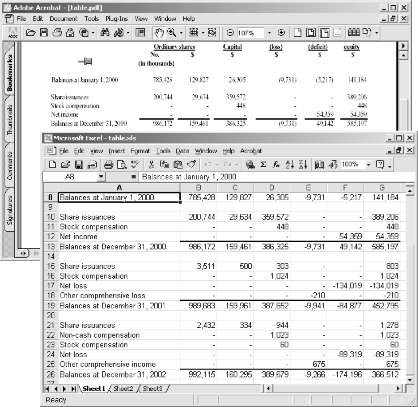Hack 55 Easily Attach Your Document's Tables
![]()
![]()
Pack your document's essential information into its PDF edition.
Readers copy data from PDF documents to use in their own documents or spreadsheets. Tables usually contain the most valuable data, yet they are the most difficult to extract from a PDF [Hack #7]. Give readers what they need, as shown in Figure 5-4, by automatically extracting tables from your source document, converting them into an Excel spreadsheet, and then attaching them to your PDF.
Figure 5-4. Giving your readers live data to work with

5.6.1 Copy Tables into a New Document
In Microsoft Word, use the following macro to copy a document's tables into a new document. In Word, create the macro like so.
Open the Macros dialog box (Tools 

A window will open where you can enter the macro's code. It already will have two lines of code: Sub CopyTablesIntoNewDocument() and End Sub. You don't need to duplicate these lines.
You can download the following code from http://www.pdfhacks.com/copytables/:
Sub CopyTablesIntoNewDocument( )
' version 1.0
' http://www.pdfhacks.com/copytables/
Dim SrcDoc, NewDoc As Document
Dim SrcDocTableRange As Range
Set SrcDoc = ActiveDocument
If SrcDoc.Tables.Count <> 0 Then
Set NewDoc = Documents.Add(DocumentType:=wdNewBlankDocument)
Set NewDocRange = NewDoc.Range
Dim PrevPara As Range
Dim NextPara As Range
Dim NextEnd As Long
NextEnd = 0
For Each SrcDocTable In SrcDoc.Tables
Set SrcDocTableRange = SrcDocTable.Range
'output the preceding paragraph?
Set PrevPara = SrcDocTableRange.Previous(wdParagraph, 1)
If PrevPara Is Nothing Or PrevPara.Start < NextEnd Then
Else
Set PPWords = PrevPara.Words
If PPWords.Count > 1 Then 'yes
NewDocRange.Start = NewDocRange.End
NewDocRange.InsertParagraphBefore
NewDocRange.Start = NewDocRange.End
NewDocRange.InsertParagraphBefore
NewDocRange.FormattedText = PrevPara.FormattedText
End If
End If
'output the table
NewDocRange.Start = NewDocRange.End
NewDocRange.FormattedText = SrcDocTableRange.FormattedText
'output the following paragraph?
Set NextPara = SrcDocTableRange.Next(wdParagraph, 1)
If NextPara Is Nothing Then
Else
Set PPWords = NextPara.Words
NextEnd = NextPara.End
If PPWords.Count > 1 Then 'yes
NewDocRange.Start = NewDocRange.End
NewDocRange.InsertParagraphBefore
NewDocRange.FormattedText = NextPara.FormattedText
End If
End If
Next SrcDocTable
End If
End SubRun this macro from Word by selecting Tools 

5.6.2 Create an HTML or Excel Document from Your Tables Document
Use [Hack #35] to convert this new document into HTML. Make this HTML file act like an Excel spreadsheet by changing its filename extension from html to xls. Excel is perfectly comfortable opening data this way.
|
5.6.3 Attach the Tables to Your PDF
See [Hack #54] for the detailed procedure. Speed up attachments with quick attachment actions [Hack #56] .







